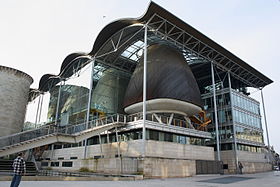Ivan Harbour
Ivan Harbour | |
|---|---|
 | |
| Born | June 3, 1962[1] Irvine, Scotland |
| Nationality | British |
| Alma mater | Bartlett School of Architecture |
| Occupation | Architect |
| Awards | Stirling Prize (2006 and 2009) |
| Practice | Rogers Stirk Harbour + Partners |
| Buildings | Lloyd's building (Grade I) European Court of Human Rights building Senedd, Cardiff Terminal 4 of Madrid-Barajas Airport Maggie's Centre, London |
| Website | www |
Ivan William Harbour (born 3 June 1962) is an architect and senior partner at Rogers Stirk Harbour + Partners. He joined the Richard Rogers Partnership in 1985 and by 2007 the name of the practice changed to Rogers Stirk Harbour + Partners in recognition of Graham Stirk and Harbour's contribution to the firm.
He has been the leading architect on two Stirling Prize winning entries for the practice in 2006 and 2009 for Terminal 4 of Madrid-Barajas Airport and Maggie's Centre, London respectively.
Early life and career[]

Harbour was born in 1962 in Irvine, Scotland.[2] However he was brought up in the West Country.[3] Harbour joined the Richard Rogers Partnership in 1985 after studying architecture at the Bartlett School of Architecture, University College London,[2] where he obtained a Bachelor of Science degree (BSc (Hons)) during 1980-83 and a Diploma in Architecture (Dipl. Arch.) in 1985.[4]
During 1983 he joined Yorke Rosenberg Mardall (YRM) as part of his studies and in 1984-85 he was with the London Borough of Hackney.[4] After his studies he joined the Richard Rogers Partnership in 1985 and was made a director of in 1993.[4] In 1998 he was made a director of the practice and by 2007 the name of the practice changed from Richard Rogers Partnership to Rogers Stirk Harbour + Partners.[4] In 2011 he was made a senior partner in the firm.[4]
The Guardian's Charlotte Higgins described Harbour's work, in comparison with fellow partner Graham Stirk, to be "more expressive and sculptural" such as Madrid airport's brightly coloured Terminal 4.[3]
Notable works[]
When Harbour joined Rogers Stirk Harbour + Partners in 1985, he started as part of a team working on the Richard Rogers Lloyd's building in London.[5] He has gone on to lead design teams on the European Court of Human Rights building, the Bordeaux Law Courts,[5] and winning the Stirling Prize for the practice in 2006 and 2009 for Terminal 4 of Madrid-Barajas Airport and Maggie's Centre, London respectively.[4]
Images of a selection of Ivan Harbour's work[]
Bordeaux Law Courts, Bordeaux, France

Terminal 4 Barajas Airport, Madrid, Spain

Oxley Woods housing development in Milton Keynes, England

Torre BBVA Bancomer, Mexico.

Maggie's Centre, London

Lloyd's building, London
Antwerp Law Courts, Antwerp, Belgium

Mossbourne Community Academy, London

R9 Station, Kaohsiung, Taiwan

8 Chifley, Sydney, Australia
Other projects that have been designed / led by Harbour includes:
- Barangaroo masterplan, Sydney, Australia
- 300 New Jersey Avenue offices, Washington DC, USA
- Parc1, Seoul, South Korea
- International Quarter masterplan, London.[5]
- PLACE / Ladywell, London
- Nuovo Centro Civico, Scandicci, Italy
See also[]
Notes[]
- ^ "See change of Director's Details on 14 Nov 2011". Companies House. Retrieved 2019-02-25.
- ^ Jump up to: a b Cost-Effective Building: Economic concepts and constructions. De Gruyter Oldenbourg. 17 December 2012. ISBN 9783034615105. Retrieved 2016-03-17.
- ^ Jump up to: a b "Interview: architects Richard Rogers, Graham Stirk and Ivan Harbour". theguardian.com. Retrieved 2016-03-17.
- ^ Jump up to: a b c d e f "Ivan Harbour" (PDF). Archived from the original (PDF) on 2012-10-18. Retrieved 2016-03-24.
- ^ Jump up to: a b c "Ivan Harbour". New London Architecture. Retrieved 2016-03-24.
External links[]
 Media related to Ivan Harbour at Wikimedia Commons
Media related to Ivan Harbour at Wikimedia Commons- Profile on the official website
- Alumni of The Bartlett
- 1962 births
- Living people
- 20th-century British architects
- People from Irvine, North Ayrshire











